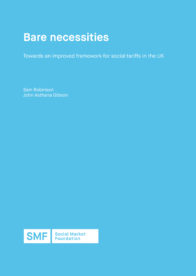The cost of living crisis has left many households struggling to afford essential goods and services. This report explores the case for social tariffs – discounts offered to certain vulnerable customers – the goods they are best suited to and how they should be designed to deliver for all.
SUMMARY
- At present, markets are failing to ensure vulnerable households have affordable access to essential goods and services, and the existing social security system is insufficiently generous to help ease the burden. Social tariffs are a useful tool to address this shortcoming and help these households afford the basics.
- The case for social tariffs is strongest in essential goods and services where there is limited competition between providers and where there are knock-on consequences for households or other policy priorities. These include household utilities like water and electricity, broadband, public transport and car insurance.
- The existing offering of social tariffs suffers from poor targeting, inconsistent eligibility and generosity and low take-up. To address these shortcomings, a social tariff system must be designed to reach households outside of the benefits system, ensure help is directed at those who need it most, and be consistent and easy to access.
- Ideally, social tariff eligibility would be based on household income and a bills-to-income ratio. This would require the use of real-time data from HMRC in conjunction with data from DWP and service providers. It should also be applied automatically rather than relying on households to apply for them, and be funded through general taxation.
- The ideal system requires significant political will and new data-sharing architecture, but other steps are needed to improve the existing social tariff system in the short-term. These include minimising differences between social tariff schemes offered by providers, reducing barriers to exiting social tariffs and developing cross-subsidies to pool risk between providers.

DOWNLOAD THE REPORT: PDF
Kindly commissioned by

